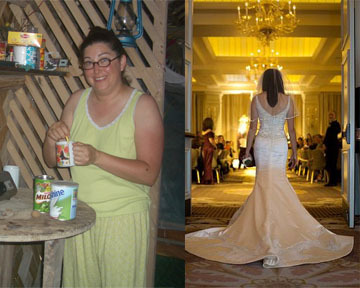Are you searching for inspiration and a gift for yourself or your partner for Valentine's Day? Your relationship can change your life.
Love Me Slender is a book about how couple's impact each other's lives in every choice. The hardest change is to go from inaction to action. Do you wish that Chris Powell from the Biggest Loser would come to your house and be your coach? Recruit the coach you already have -- your partner or spouse. With my then-boyfriend and now husband, George's, help, I lost over 60 pounds and have kept it off for nearly five years.
Together, you can say no to unhealthy snacks, which seem to cost less in the moment but will cost more time in the exercise to get rid of those extra calories. You can shop together or shop for your partner so the unhealthy foods do not enter the house.
I will never forget being at a workshop about Physical Education at UCLA, the future teachers in the class were arguing that they did not have time to shop for healthy foods and cook for themselves. The presenter said, "Do you watch television?" He said, "Those people in the show are not your friends. They will not call you when you are sick. Stop giving them your time. Take that hour and go to the store, cut up some vegetables, cook your dinner and choose yourself." I realized we make choices and vote with our time every day.
Thomas N. Bradbury and Benjamin R. Karney share their research about couples support in their book, Love Me Slender, and say, "our closest relationships serve as the very foundation for our health." We need to make use of our partnerships to inspire us to save our own lives. We figure out how to save money for retirement and we need to choose to make time to eat right and exercise as part of our long-term commitments.
They cite obesity and dieting figures in the United States: "33 percent of men and 46 percent of women are actively trying to lose weight at any given moment. Two in every three Americans are currently overweight or worse. 50 percent of us are almost completely sedentary."
Bradbury and Karney claim "our partners can give us the push that moves us past the pastries and toward the whole grains." I know that my partner made all the difference in my weight loss. I was inspired before we met but he really kept me on track.
As the UCLA scientists say, "When there is someone we live with, sleep with, and wake up with, that person cannot avoid affecting us, and we cannot avoid affecting that person with every choice we make, whether we want to or not." In their case studies, they reveal how misunderstandings between couples can thwart attempts for a healthy life. Learning to communicate better is a priority for change and makes it easier to commit to healthier choices together.
Couples can:
• Find easy ways to make small changes in the areas of eating or exercise that are most important to you. Literally and figuratively, you may need to learn how to walk before you run.
• Recognize subtle but important accomplishments and use them to convince each other that even greater changes are possible.
• Take initiative on your own to eat right and move more and see how your partner responds.
In their book, they talk about the 20-year study by the National Weight Control Registry at Brown University Medical School that I am part of. The NWCR has interviewed over 10,000 people who have successfully lost a large amount of weight and maintained it. I did not realize as the scientists explain that "these people are rare -- a tiny fraction compared with the millions of people whose efforts to control what they eat are much less successful." The goal is to thwart short-term thinking for instant gratification with junk food and choose to eat healthy for a long life.
Lisa: Before and After
Why can people be committed to their relationship but not eating for themselves? Both require making choices to the future. "Weight that takes years to gain may take years to lose, especially if we plan to keep it off. In a world where living eighty years or longer is a real possibility, our plans to lose weight have to take decades into account, not weeks or months." It is more important to be healthy than to be skinny, and we need to learn to invest in ourselves to reach our long-term goals for healthy eating and exercise.
"Many working couples set aside a portion of their monthly income toward retirement accounts. When it comes to financial matters, they are perfectly willing to forgo the pleasures that the extra money might buy them in the present, so that they may afford comfortable lives in the future. Treat exercise and fitness the same way. An hour that one partner spends at the gym tonight takes time that might have been spent together, but it is also an investment in the active, healthy life that both partners want to enjoy as they get older."
Many things we want in life take effort. To get out of debt. To save for retirement. To lose weight. To eat healthy. To exercise. To cherish our partner. If you want to transform your life, you have to put in the time and energy.
"Is it any wonder that love, arguably the most powerful force in our lives, would emerge as the best hope that any of us have to eat right, move more, and live well?"
About this Review: Lisa Niver Rajna is traveling the world with her soul mate and husband, George. They left Los Angeles in July 2012. Follow their journey at We Said Go Travel. Read about her weight loss of sixty pounds in their memoir, Traveling in Sin.

